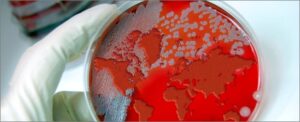
Superbugs from animals now pose a global threat after becoming resistant to antibiotic defences.
Chinese researchers have discovered an “extremely worrying” gene that makes infectious bacteria such as Escherichia coli (E.coli) highly resistant to polymyxins. Polymyxins are the last line of antibiotic defence that doctors can resort to when everything else has failed. The gene is said to be easily transferable and has the potential to cause global epidemics.
Researchers and scientists have discovered that the gene can transfer its immunity to antibiotics to different strains of bacteria via the mobile gene mcr-1. This increases the likelyhood of epidemics spreading due to the lack of a cure for these “superbugs”. Scientists isolated a sample from an intensively farmed pig in Shanghai during routine testing, revealing an E.coli strain showing resistance to the polymyxin drug colistin.
Between 2011 and 2014, further tests of bacterial samples were collected from pigs at slaughter in four Chinese provinces, and pork and chicken sold in 30 open markets and 27 supermarkets across the Guangzhou province. Researchers also took samples from infected patients at two separate hospitals in the Chinese provinces of Guangdong and Zhejiang.
According to scientists, the presence of the super resistant gene is increasing year by year. Lead researcher Professor Jian-Hua Liu, from the South China Agricultural University in Guangzhou described the findings as extremely alarming.
“These are extremely worrying results. The polymyxins (colistin and polymyxin B) were the last class of antibiotics in which resistance was incapable of spreading from cell to cell. Until now, colistin resistance resulted from chromosomal mutations, making the resistance mechanism unstable and incapable of spreading to other bacteria.
“Our results reveal the emergence of the first polymyxin resistance gene that is readily passed between common bacteria such as Escherichia coli and Klesbsiella pneumoniae, suggesting that the progression from extensive drug resistance to pan-drug resistance is inevitable.”
Scientists writing in The Lancet Infectious Diseases journal said that it is likely that polymyxin resistance via mcr-1 originated in animals before spreading to humans. They also noted that the increasingly heavy use of colistin by Chinese farmers may also have helped E.coli to acquire the gene. An immediate risk assessment of colistin use in animal feed additives was launched by the Chinese Ministry of Agriculture in an attempt to combat the spread of the gene in some way.
British experts called the discovery “disturbing” and “alarming”, with Dr David Burch, a veterinary surgeon and independent member of the Ruma (Responsible Use of Medicines in Agriculture) Alliance, describing the report as “disturbing and disappointing”.
Dr Burch pointed out that China’s pig farming industry is the largest in the world and is more than twice the size of Europe’s farming industry. The use of generic antimicrobial drugs in animals is not normally under veterinary control in China.
Professor Nigel Brown, president of the Microbiology Society, said: “This discovery that resistance to colistin can be transferred between bacteria is alarming.
“Although resistance to this important and widely-used polymyxin group of antibiotics has previously been shown, it was generally caused by mutation in individual organisms. Now that it has been demonstrated that resistance can be transferred between bacteria and across bacterial species, another line of defence against infection is in danger of being breached.
“We need careful surveillance to track the potential global spread of this resistance, and investment in research to discover new drugs with different modes of action.”


